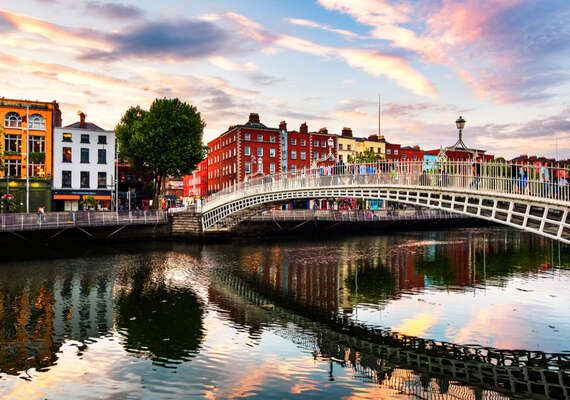Dublin City Guide

| Country: | Ireland |
| Known Names: | |
| Language: | English, Irish |
| Population: | Approx. 1.4 million |
| Religion: | Christianity (Roman Catholic) |
| Area Code: | +353 1 |
| Currency: | Euro (EUR) |
| Time Zone: | Greenwich Mean Time (GMT) - UTC/GMT +0 hours; Daylight saving: Irish Standard Time (IST) +1 hour |
| Visa: | |
| Consulate: |
General Information / Guide
Dublin, the capital of Ireland, is known for its literary heritage, vibrant nightlife, and rich history. The city is divided into two main parts by the River Liffey. Dublin combines charm with cultural heritage, hosting numerous museums, galleries, and theaters, alongside historic pubs and modern restaurants.
Climate / Weather / When to Go
Dublin has a maritime temperate climate with mild winters and cool summers. Rain is frequent. The best times to visit are late spring and summer when the weather is warmer and drier, and the days are longer.
How to Get There
Dublin Airport serves as the main international gateway, with extensive flight options to Europe and other continents. The city is compact and walkable, and also offers an efficient network of buses and trams.
Food / Restaurants / What to Eat and Drink
Dublin’s food scene includes traditional Irish dishes like Irish stew, soda bread, and seafood. The city is also famous for its pubs where you can enjoy a pint of Guinness.
Important Places / Places to Visit
- Guinness Storehouse: Learn about the history of Guinness and enjoy a drink with a view at the Gravity Bar.
- Dublin Castle: Steeped in history, it was the seat of power for centuries.
- Trinity College and the Book of Kells: A historic university that houses the famous illuminated manuscript.
- Temple Bar: Known for its lively atmosphere and cultural events.
- St. Patrick's Cathedral: The largest cathedral in Dublin, associated with Saint Patrick since the 5th century.
What to Do
Dublin is a city of literature and lush landscapes. Visit the Book of Kells at Trinity College or stroll through St Stephen’s Green. For a deeper dive into Irish culture, explore the Little Museum of Dublin or enjoy a traditional Irish music session at a local pub.
Nightlife / Bars / Entertainment
Dublin's nightlife is world-renowned, particularly for its pubs. The Temple Bar area, while touristy, is vibrant and full of character. For a more authentic experience, visit the Cobblestone in Smithfield where live folk music is a staple. For craft beer enthusiasts, The Porterhouse offers an excellent selection.
Shopping / What to Buy
Dublin offers a variety of shopping from high-end boutiques on Grafton Street to the quaint shops of the Creative Quarter where you can find Irish-made crafts. Typical Irish souvenirs include Aran sweaters, crafted jewelry, and, of course, Irish whiskey from one of the many distilleries around the city.
Festival / Fuar
January: New Year’s Festival
March: St. Patrick's Festival
April: Easter Rising Commemorations
May: Dublin Dance Festival
June: Bloomsday
July: Longitude Festival
August: Dublin Horse Show
September: Dublin Fringe Festival
October: Bram Stoker Festival
November: Dublin Book Festival
December: Christmas Celebrations
Holidays / Festivals / Important Days
1 January: New Year's Day
17 March: Saint Patrick's Day
Easter (dates vary)
First Monday in May: May Day
First Monday in June: June Bank Holiday
First Monday in August: August Bank Holiday
Last Monday in October: October Bank Holiday
25 December: Christmas Day
26 December: St. Stephen's Day
Dublin celebrates these and other events like Bloomsday on 16 June and various cultural and literary festivals throughout the year.
Things to Pay Attention to / Important Information
Before visiting Dublin, learn about Irish customs and culture to show respect. Respectful behavior and modest dress are expected in religious sites. English is spoken with an Irish accent; appreciate this aspect of their cultural identity. While shopping in markets or busy streets like Grafton Street, keep an eye on your possessions and be aware of your surroundings. Knowing a few phrases in Irish can be charming. Dublin’s weather can be damp and unpredictable, so dress in layers and always have an umbrella or raincoat handy.
Transportation
In Dublin, transportation includes buses, trams (Luas), and commuter trains, all offering extensive coverage across the city and suburban areas. Dublin Bus and Luas fares are competitively priced. Taxis are plentiful and can either be hailed on the street or booked via app. While driving is common, traffic delays are typical during morning and evening rush hours.
